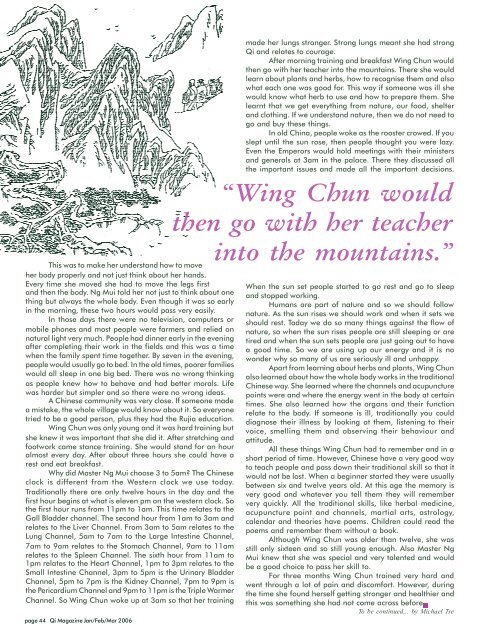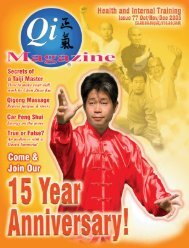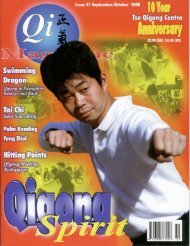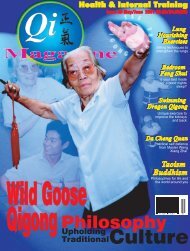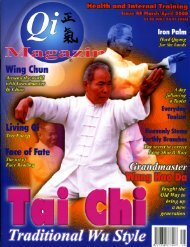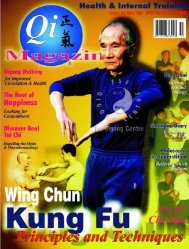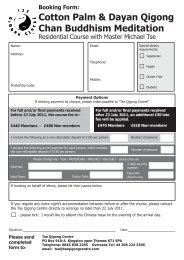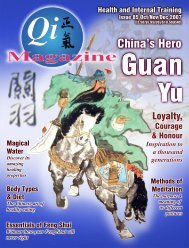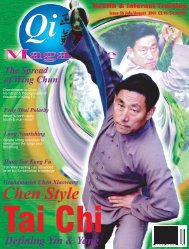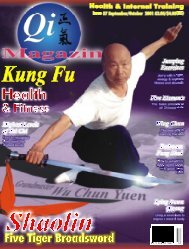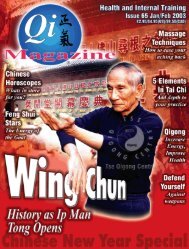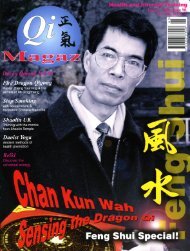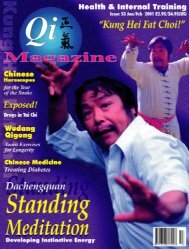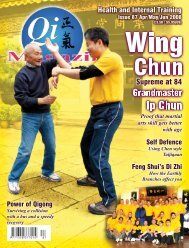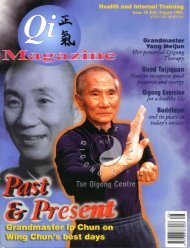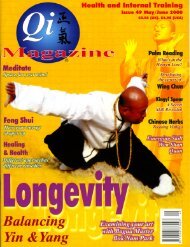Issue 78 - Tse Qigong Centre
Issue 78 - Tse Qigong Centre
Issue 78 - Tse Qigong Centre
- TAGS
- issue
- qigong
- qimagazine.com
Create successful ePaper yourself
Turn your PDF publications into a flip-book with our unique Google optimized e-Paper software.
This was to make her understand how to move<br />
her body properly and not just think about her hands.<br />
Every time she moved she had to move the legs first<br />
and then the body. Ng Mui told her not just to think about one<br />
thing but always the whole body. Even though it was so early<br />
in the morning, these two hours would pass very easily.<br />
In those days there were no television, computers or<br />
mobile phones and most people were farmers and relied on<br />
natural light very much. People had dinner early in the evening<br />
after completing their work in the fields and this was a time<br />
when the family spent time together. By seven in the evening,<br />
people would usually go to bed. In the old times, poorer families<br />
would all sleep in one big bed. There was no wrong thinking<br />
as people knew how to behave and had better morals. Life<br />
was harder but simpler and so there were no wrong ideas.<br />
A Chinese community was very close. If someone made<br />
a mistake, the whole village would know about it. So everyone<br />
tried to be a good person, plus they had the Rujia education.<br />
Wing Chun was only young and it was hard training but<br />
she knew it was important that she did it. After stretching and<br />
footwork came stance training. She would stand for an hour<br />
almost every day. After about three hours she could have a<br />
rest and eat breakfast.<br />
Why did Master Ng Mui choose 3 to 5am? The Chinese<br />
clock is different from the Western clock we use today.<br />
Traditionally there are only twelve hours in the day and the<br />
first hour begins at what is eleven pm on the western clock. So<br />
the first hour runs from 11pm to 1am. This time relates to the<br />
Gall Bladder channel. The second hour from 1am to 3am and<br />
relates to the Liver Channel. From 3am to 5am relates to the<br />
Lung Channel, 5am to 7am to the Large Intestine Channel,<br />
7am to 9am relates to the Stomach Channel, 9am to 11am<br />
relates to the Spleen Channel. The sixth hour from 11am to<br />
1pm relates to the Heart Channel, 1pm to 3pm relates to the<br />
Small Intestine Channel, 3pm to 5pm is the Urinary Bladder<br />
Channel, 5pm to 7pm is the Kidney Channel, 7pm to 9pm is<br />
the Pericardium Channel and 9pm to 11pm is the Triple Warmer<br />
Channel. So Wing Chun woke up at 3am so that her training<br />
page 44 Qi Magazine Jan/Feb/Mar 2006<br />
made her lungs stronger. Strong lungs meant she had strong<br />
Qi and relates to courage.<br />
After morning training and breakfast Wing Chun would<br />
then go with her teacher into the mountains. There she would<br />
learn about plants and herbs, how to recognise them and also<br />
what each one was good for. This way if someone was ill she<br />
would know what herb to use and how to prepare them. She<br />
learnt that we get everything from nature, our food, shelter<br />
and clothing. If we understand nature, then we do not need to<br />
go and buy these things.<br />
In old China, people woke as the rooster crowed. If you<br />
slept until the sun rose, then people thought you were lazy.<br />
Even the Emperors would hold meetings with their ministers<br />
and generals at 3am in the palace. There they discussed all<br />
the important issues and made all the important decisions.<br />
“Wing Chun would<br />
then go with her teacher<br />
into the mountains.”<br />
When the sun set people started to go rest and go to sleep<br />
and stopped working.<br />
Humans are part of nature and so we should follow<br />
nature. As the sun rises we should work and when it sets we<br />
should rest. Today we do so many things against the flow of<br />
nature, so when the sun rises people are still sleeping or are<br />
tired and when the sun sets people are just going out to have<br />
a good time. So we are using up our energy and it is no<br />
wonder why so many of us are seriously ill and unhappy.<br />
Apart from learning about herbs and plants, Wing Chun<br />
also learned about how the whole body works in the traditional<br />
Chinese way. She learned where the channels and acupuncture<br />
points were and where the energy went in the body at certain<br />
times. She also learned how the organs and their function<br />
relate to the body. If someone is ill, traditionally you could<br />
diagnose their illness by looking at them, listening to their<br />
voice, smelling them and observing their behaviour and<br />
attitude.<br />
All these things Wing Chun had to remember and in a<br />
short period of time. However, Chinese have a very good way<br />
to teach people and pass down their traditional skill so that it<br />
would not be lost. When a beginner started they were usually<br />
between six and twelve years old. At this age the memory is<br />
very good and whatever you tell them they will remember<br />
very quickly. All the traditional skills, like herbal medicine,<br />
acupuncture point and channels, martial arts, astrology,<br />
calendar and theories have poems. Children could read the<br />
poems and remember them without a book.<br />
Although Wing Chun was older than twelve, she was<br />
still only sixteen and so still young enough. Also Master Ng<br />
Mui knew that she was special and very talented and would<br />
be a good choice to pass her skill to.<br />
For three months Wing Chun trained very hard and<br />
went through a lot of pain and discomfort. However, during<br />
the time she found herself getting stronger and healthier and<br />
this was something she had not come across before<br />
To be continued… by Michael <strong>Tse</strong>


